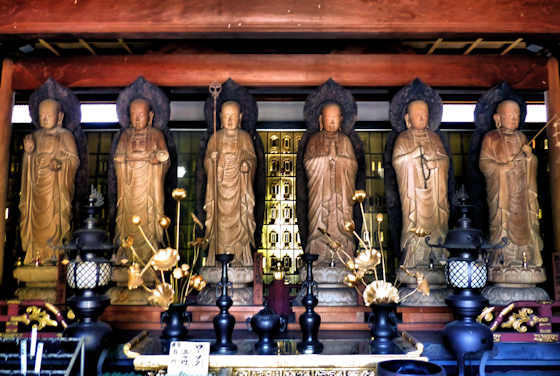Mizuko Temple Monju-in
Monju-in is one of a cluster of mountain-top temples at about 450 meters above sea level in the mountains overlooking Sasaguri in Fukuoka. A couple of the temples are part of the Sasaguri pilgrimage, but Monju-in isn't.
The temple was founded in 1981 and is a branch of the Omuro Shingon sect whose head temple is Ninna-ji in
Kyoto. The honzon is a Jizo, but the temple is most well-known for Mizuko Jizo.
Jizo is an incredibly popular deity in Japan, technically a bodhisattva, like Kannon, and there are an untold number of Jizo's, each known for particular benefits.
Jizo statues are often found alongside roads and so have a reputation as a protector;r of travelers. In many instances, Jizo statues replaced dosojin, stones representing the kami protecting boundaries. When I first started walking the back roads of Japan I noticed every pass would have a Jizo.
However, it is as protector of children that Jizo is most well-known, and Mizuko Jizo, a modern, specifically Japanese, Jizo, looks after the souls of the unborn, aborted, miscarried, and still-born babies. Mizuko Jizo has become very widely known nowadays and has even made inroads in some western societies.
The six realms of suffering in Buddhism leads to groupings of 6 Jizo, as in 5th photo, notice how each Jizo is carrying different objects and performing different mudras with his hands. Not sure of the meaning of the three differently colored Jizo in the above photo.
Jizo nowadays very often appears with child-like features, though many manifestations have nothing to do with children, Fukuyose Jizo, photo 2, is for general good luck, and there are Jizo for success in business as well as a "victory" Jizo enshrined here at Monju-in
Koyasu Jizo is a protector of motherhood and of all children, not just those who have died young.
Jizo's origins are in India, though China and Korea were responsible for many of the texts connected to Jizo in Japan. Also, curiously, like the other very popular bodhisattva in Japan, Kannon, Jizo seems to have changed sex in China, Korea, and Japan, from female to male, the opposite to Kannon who went from male to female.
Buy Goods From Japan























Beautiful photos!
ReplyDelete